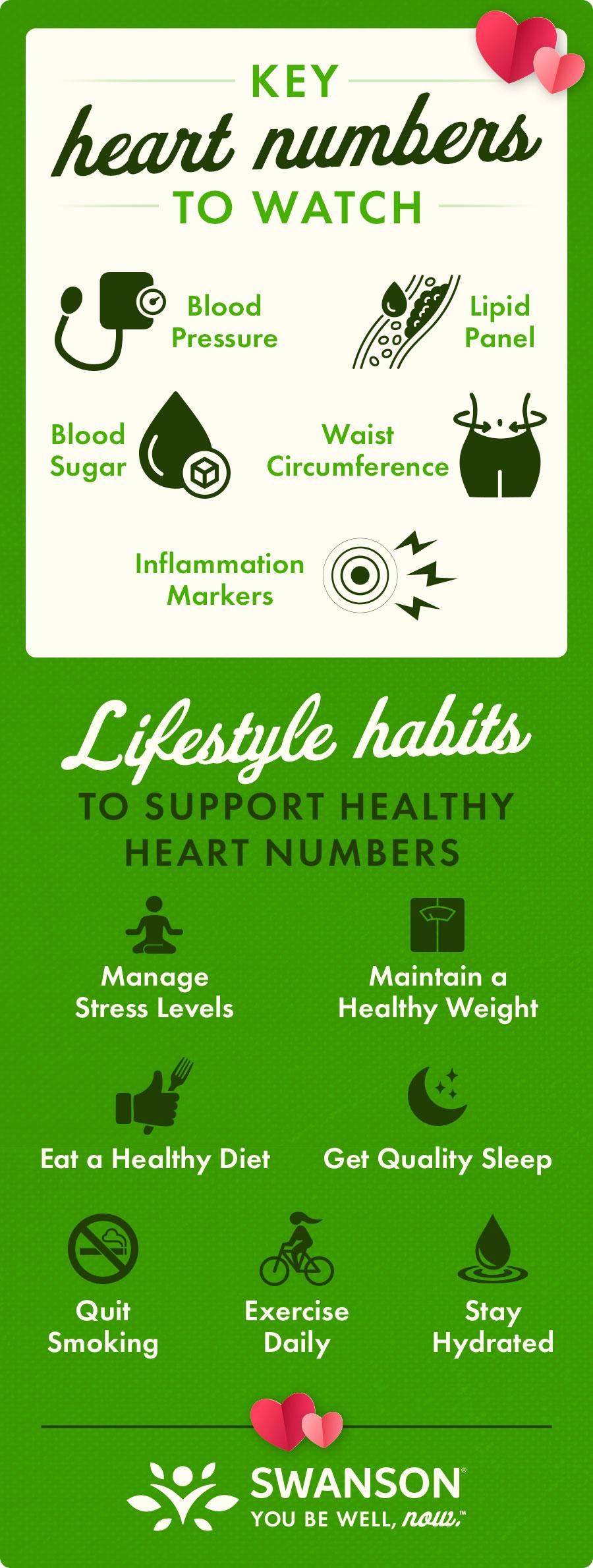Know Your Numbers: A Guide for Heart Health
If keeping your heart healthy is on your mind this February during Heart Health Month, learning what your numbers mean is a great place to start. Five main numbers influence your risk of heart disease, and understanding these can help you keep your heart healthy.

Blood Pressure
Blood pressure is checked at almost every doctor’s appointment because it is a simple measurement that provides clues for your health and cardiovascular well-being. It is two numbers that measure the pressure in your arteries at slightly different times.
The first number, called the systolic pressure, shows the force your heart uses to push blood through your body. The second number, the diastolic pressure, indicates the pressure in your arteries when your heart is at rest.
Blood pressure can vary throughout the day based on recent activities and your emotional state. A healthy blood pressure is defined as less than 120/80 and high blood pressure is 130/80 and above.1
Lipid Panel
Cholesterol is a waxy, fat-like substance found in all the cells of the body. While it has important functions for overall health, not all forms of cholesterol are the same. Some types of cholesterol increase our risk of cardiovascular disease more than others.
For the general population, healthy lipid levels are:2
- Total cholesterol: 200 mg/dL or less
- LDL cholesterol: 100 mg/dL or less
- HDL cholesterol: 60 mg/dL or above
- Non-HDL cholesterol: 130 mg/dL or less
- Triglycerides: 150 mg/dL or less
Your ideal numbers may be different based on your age, gender and health status.
Inflammation
Inflammation is the body’s natural response to injury or illness. It is meant to help us heal from injury and then return to baseline levels. But many of us are dealing with a high level of chronic inflammation, which can increase the risk of many illnesses, including heart disease.
One way to measure inflammation is through two markers called C-reactive protein (CRP) and hs-CRP (high sensitivity) which tend to increase when high levels of inflammation are present. A normal value of CRP is less than 0.3 mg/dL and hs-CRP should be less than 1 mg/L. A level higher than that may indicate an increased risk of heart disease or other conditions.3
Waist circumference, discussed below, is another indicator of inflammation that you can easily do at home.
Blood Sugar
Blood sugar, or glucose, is the main energy source for our bodies. While it is essential for our day-to-day function, the amount in the blood must be tightly regulated. Too much or too little blood sugar can have serious consequences for our health.
Chronically high blood sugar can increase the risk of heart disease and diabetes. A healthcare provider will usually check two numbers to evaluate blood sugar: your fasting blood sugar and HbA1C, an indicator of your average blood sugar over the last three months. These numbers should be:4
- Fasting blood sugar: 100 mg/dL or less
- HbA1c: 5.7% or less
Waist Circumference
Waist circumference is the measurement around your abdominal area at the top of the hip bones, called the iliac crest. It is used as a way to assess how much abdominal (belly) fat you have. A high waist circumference, or a large amount of abdominal fat, is a risk factor for heart disease and metabolic syndrome.5
- For men: less than 40 inches (102 centimeters)
- For women: less than 35 inches (88 centimeters)
Lifestyle Habits to Support Healthy Heart Numbers
Even if one or more of these numbers is elevated for you, there is a lot you can do to support your heart with healthy lifestyle habits.
Diet: A balanced diet that includes plenty of fruits, vegetables, nuts, whole grains and lean proteins can improve blood pressure, cholesterol and blood sugar levels. Limit sodium, saturated fat and sugar.
Healthy weight: Maintaining an ideal weight (particularly in the mid-section) reduces strain on the heart, improves insulin resistance and supports circulatory health. You can use a BMI calculator to help determine your ideal body weight.
Exercise: Regular physical activity strengthens the heart and maintains healthy blood pressure. The American Heart Association recommends at least 150 minutes of moderate aerobic activity per week.
Hydration: Stay hydrated by drinking enough fluids throughout the day to support healthy blood circulation.
Manage stress: High stress can elevate blood pressure and disrupt sleep, harming cardiovascular health, but practices like meditation can help support a healthy response to stress.
Sleep: Aim for 7-8 hours of quality sleep to support overall heart health and regulate hormones.
Quit smoking: Stopping smoking reduces harm to your cardiovascular system and promotes overall heart health.
Mastering Your Numbers for a Stronger Heart
Understanding your key heart health numbers can be the cornerstone of maintaining a healthy heart and lowering your risk factors. By keeping track of blood pressure, cholesterol levels, inflammation markers, blood sugar and waist circumference, you can take proactive steps to support your health.
Be sure to consult with your healthcare provider to understand your risk levels and help ensure that the appropriate numbers are being checked and monitored for your heart health.
You be well, now.
Swanson
*These statements have not been evaluated by the Food and Drug Administration. These products are not intended to diagnose, treat, cure, or prevent any disease.

About Michelle Routhenstein, MS, RD, CDCES, CDN
Michelle Routhenstein is the owner of Entirely Nourished, a private practice specializing in heart disease prevention and management. As a registered dietitian nutritionist, she uses a science-based, personalized approach to improve heart function, reduce cardiometabolic risks, and prevent cardiovascular complications. Michelle is recognized as a thought leader in heart disease management and shares her expertise on social media to empower individuals to take charge of their heart health. She holds both a Bachelor's and Master's degree in Clinical Nutrition from NYU and has extensive clinical experience, including at a level 1 trauma center in NYC.
Sources:
- AHA: 130/80 mm Hg Is New National BP Target. MedpageToday. Read source.
- Cholesterol Levels: What You Need to Know. Blood, Heart and Circulation. Read source.
- C-reactive protein. Medline Plus. Read source.
- Diabetes Tests & Diagnosis. National Institute of Diabetes and Digestive and Kidney Diseases. Read source.
- Assessing Your Weight and Health Risk. National Heart, Lung and Blood Institute. Read source.
- Resveratrol and cardiovascular diseases. Nutrients. Read source.
- Nattokinase: A Promising Alternative in Prevention and Treatment of Cardiovascular Diseases. Biomark Insights. Read source.
- Nauman, M. C., & Johnson, J. J. (2019). Integrative Food, Nutrition and Metabolism, 6(2), 10.15761/IFNM.1000249. Read source.
- Therapeutic potential and mechanisms of berberine in cardiovascular disease. Curr Pharmacol Rep. Read source.




